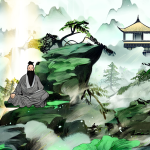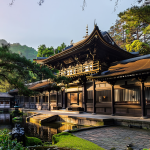《秋声赋》原文

欧阳子方夜读书,闻有声自西南来者,悚然而听之,曰:“异哉!”初淅沥以萧飒,忽奔腾而砰湃;如波涛夜惊,风雨骤至。其触于物也,鏦鏦铮铮,金铁皆鸣;又如赴敌之兵,衔枚疾走,不闻号令,但闻人马之行声。予谓童子:“此何声也?汝出视之。”童子曰:“星月皎洁,明河在天,四无人声,声在树间。”
余曰:“噫嘻悲哉!此秋声也,胡为而来哉?盖夫秋之为状也:其色惨淡,烟霏云敛;其容清明,天高日晶;其气栗冽,砭人肌骨;其意萧条,山川寂寥。故其为声也,凄凄切切,呼号愤发。丰草绿缛而争茂,佳木葱茏而可悦;草拂之而色变,木遭之而叶脱;其所以摧败零落者,乃其一气之余烈。夫秋,刑官也,于时为阴;又兵象也,于行用金;是谓天地之义气,常以肃杀而为心。天之于物,春生秋实。故其在乐也,商声主西方之音;夷则为七月之律。商,伤也,物既老而悲伤;夷,戮也,物过盛而当杀。”
“嗟乎!草木无情,有时飘零。人为动物,惟物之灵,百忧感其心,万事劳其形,有动于中,必摇其精。而况思其力之所不及,忧其智之所不能,宜其渥然丹者为槁木,黟然黑者为星星。奈何以非金石之质,欲与草木而争荣?念谁为之戕贼,亦何恨乎秋声!”
童子莫对,垂头而睡。但闻四壁虫声唧唧,如助予之叹息。
中文翻译
欧阳先生(欧阳修自称)夜里正在读书,听到有声音从西南方向传来,心里不禁悚然,他一听,惊道:“奇怪啊!”这声音初听时像淅淅沥沥的雨声,其中还夹杂着萧萧飒飒的风吹树木声,然后忽然变得汹涌澎湃起来,像是江河夜间波涛突起、风雨骤然而至。碰到物体上发出铿锵之声,又好像金属撞击的声音;再(仔细)听,又像奔赴战场的军队正衔枚疾进,听不到任何号令声,只听见有人马行进的声音。(于是)我对童子说:“这是什么声音?你出去看看。”童子回答说:“月色皎皎、星光灿烂、浩瀚银河、高悬中天,四下里没有人的声音,那声音是从树林间传来的。”
我叹道:“唉,可悲啊!这就是秋声呀,它为何而来呢(它怎么突然就来了呢)?大概是那秋天的样子:它的色调暗淡、烟飞云收;它的形貌清新明净,天空高远、日色明亮;它的气候寒冷、刺人肌骨;它的意境寂寞冷落,没有生气、川流寂静、山林空旷。所以它发出的声音时而凄凄切切,呼号发生迅猛,不可遏止。绿草浓密丰美,争相繁茂,树木青翠茂盛而使人快乐。然而,一旦秋风吹起,拂过草地,草就要变色;掠过森林,树就要落叶。它能折断枝叶、凋落花草,使树木凋零的原因,便是一种构成天地万物的混然之气(秋气)的余威。秋天是刑官执法的季节,它在季节上说属于阴;秋天又是兵器和用兵的象征,在五行上属于金。这就是常说的天地之严凝之气,它常常以肃杀为意志。自然对于万物,是要它们在春天生长,在秋天结实。所以,秋天在音乐的五声中又属商声。商声是西方之声,夷则是七月的曲律之名。商,也就是‘伤’的意思,万物衰老了,都会悲伤。夷,是杀戮的意思,草木过了繁盛期就应该衰亡。”
“唉!草木是无情之物,尚有衰败零落之时。人为动物,在万物中又最有灵性,无穷无尽的忧虑煎熬他的心绪,无数琐碎烦恼的事来劳累他的身体。只要内心被外物触动,就一定会消耗他的精气。更何况常常思考自己的力量所做不到的事情,忧虑自己的智慧所不能解决的问题?自然会使他红润的面色变得苍老枯槁,乌黑的头发(壮年)变得鬓发花白(年老)。(既然这样,)人非金石,为什么却要以不是金石的肌体去像草木那样争一时的荣盛呢?(人)应当仔细考虑究竟是谁给自己带来了这么多残害,又何必去怨恨这秋声呢?”
书童没有应答,低头沉沉睡去。只听得四壁虫鸣唧唧,像在附和我的叹息。
英文翻译
Ouyang (Ouyang Xiu referred to himself) was reading at night when he heard a sound coming from the southwest. He listened with a start and exclaimed, "Strange!" At first, it was like the light patter of rain mixed with the rustling of the wind in the trees. Then suddenly it became surging and crashing, like the waves churning at night and the sudden arrival of wind and rain. When it hit objects, it made a clanging and clinking sound, just like the clash of metal; then, listening more carefully, it was like an army marching swiftly on a mission, without hearing any commands, only the sound of people and horses moving. I said to the boy, "What is this sound? Go out and have a look." The boy replied, "The moon is bright, the stars are shining, the Milky Way is hanging high in the sky. There is no human voice around. The sound is coming from among the trees."
I sighed and said, "Alas, how sad! This is the sound of autumn. Why has it come?" It is probably the appearance of autumn: its color is dim, with the mist and clouds dispersing; its appearance is clear and bright, with the sky high and the sun shining; its air is cold and piercing, chilling to the bone; its mood is desolate, with the mountains and rivers lonely and empty. Therefore, the sound it makes is desolate and cutting, with a fierce and uncontainable cry. The grass is lush and green, competing for lushness, and the trees are verdant and pleasant. However, once the autumn wind blows and sweeps across the grass, the grass will change color; when it brushes past the forest, the leaves will fall. The reason why it can break branches and leaves and make flowers and plants wither is the remaining might of the mixed energy (autumn energy) that constitutes all things in heaven and earth. Autumn is the season when the law - enforcers are active. In terms of seasons, it belongs to yin; autumn is also a symbol of weapons and war, belonging to metal in the five elements. This is what is commonly called the solemn and killing energy of heaven and earth, which often takes severity and killing as its will. Nature treats all things in such a way that it makes them grow in spring and bear fruit in autumn. Therefore, in the five notes of music, autumn belongs to the shang note. The shang note represents the sound of the west, and yi is the name of the musical scale in the seventh month. Shang also means "sorrow". All things become sad when they are old. Yi means "killing". Plants and trees should wither after their flourishing period. (Since this is the case), human beings are not made of metal and stone. Why should they compete with plants and trees for temporary glory with a body that is not as enduring as metal and stone? (People) should carefully consider who has brought so much harm to themselves, and why hate the sound of autumn?
The boy did not answer and hung his head to sleep. All that could be heard were the chirping of insects on all four walls, as if echoing my sighs.
背景补充
创作背景
宋仁宗嘉祐四年(1059年),欧阳修由汴京前往颍州(今安徽阜阳)途中,目睹了秋天的萧瑟景象,联想到自己一生的坎坷经历以及当时社会的种种问题,有感而发创作了这篇《秋声赋》。当时欧阳修已年届五十,经历了宦海浮沉,对人生的苦难和世事的无常有了更深刻的感悟。他以秋声为引,借景抒情,表达了对时光流逝、人生易老的感慨,以及对生命短暂和命运无常的思考。
作者简介
欧阳修(1007年 - 1072年),字永叔,号醉翁,晚号六一居士,吉州永丰(今江西省吉安市永丰县)人,北宋政治家、文学家、史学家,“唐宋八大家”之一。
欧阳修自幼聪明好学,宋仁宗天圣八年(1030年)中进士。他历仕仁宗、英宗、神宗三朝,官至翰林学士、枢密副使、参知政事等职。他积极参与政治改革,支持范仲淹的“庆历新政”,虽遭挫折,但仍坚持自己的政治理想。
在文学方面,欧阳修是北宋诗文革新运动的领袖。他主张文章应“明道”“致用”,反对浮靡文风,提倡平易自然的文风。他的散文风格清新自然,委婉曲折,说理透彻,抒情真挚,具有很高的艺术价值。他的代表作品有《醉翁亭记》《秋声赋》《朋党论》等。在史学方面,他主编了《新唐书》,并独立撰写了《新五代史》。
文章主旨
《秋声赋》的主旨是通过描写秋声的凄切,引发对人生短暂、时光易逝的感慨,进而表达作者对生命的珍惜和对自然规律的敬畏之情。作者由秋声联想到草木的凋零、人生的衰老,感叹人在自然面前的渺小和无力。同时,他也指出人应该摆脱无谓的忧虑和烦恼,顺应自然规律,珍惜当下的时光,以平和的心态面对人生的起伏。
作品影响
《秋声赋》是一篇经典的文赋,具有很高的艺术价值。它以细腻的笔触描绘了秋声的特点和变化,将听觉感受转化为生动的形象描写,使读者仿佛身临其境。文章的语言优美流畅,富有节奏感和韵律美,体现了作者高超的文学技巧。同时,《秋声赋》所表达的思想也具有深刻的哲理意义,引发了后人对人生、自然和命运的思考。它对后世的文学创作产生了深远的影响,许多文人墨客在创作中借鉴了它的写作手法和思想内涵。












评论功能已关闭。